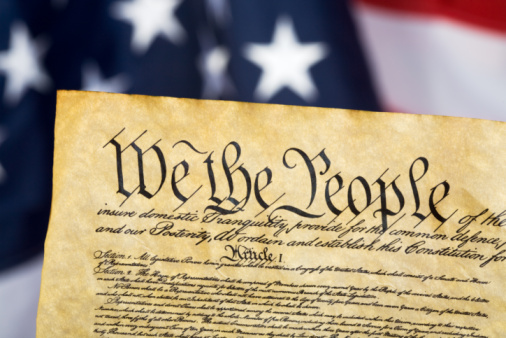
Disputes about the limits of executive power cannot be productively resolved by appeals to the Constitution.
When the House voted recently to approve a lawsuit against President Obama, U.S. Rep. Virginia Foxx (R-N.C. 5th District) declared, “This is not about politics. If there were a Republican president doing the same thing, I would feel just as strongly. This is about the Constitution.”
Perhaps that’s true for Foxx, but the reality is that the approval of a House lawsuit is only the most recent manifestation of a longstanding trend. Politicians of both parties have for too long dragged the Constitution into their contests over governmental authority. It’s time to reconsider.
Like Captain Renault in Casablanca, legislators claim to be “shocked, shocked” when they find presidents of the opposing party using their authority – whether by issuing executive orders, implementing department-level policy initiatives, or releasing legislative signing statements. Yet partisans are not alarmed by these actions when a president shares their same affiliation.
Where was the Republican outrage when candidate Mitt Romney promised that he would, on his first day in office, issue an executive order leading to the “dismantling” of the Affordable Care Act?
Of course, Republicans are not the only ones with selective constitutional sensitivities. Democrats vehemently attacked the Bush Administration’s use of executive authority in much the same way that Republicans now attack the Obama Administration.
Consider the outrage U.S. Rep. Henry Waxman (D-CA 33rd District) expressed when the U.S. Environmental Protection Agency (EPA) appeared to have acted at the direction of President George W. Bush to reach a decision on greenhouse gas emissions that Waxman opposed. “The law does not provide that this is the president’s decision,” Waxman declared at a 2008 legislative hearing.
But when President Barack Obama, in the opening week of his first term, directed the EPA to reconsider that same decision, Waxman apparently forgot his legal analysis from the previous year, declaring Obama’s action to be “tremendous and long overdue.”
Flip-flopping itself is not the issue. What’s troubling is when politicians deploy the law tactically to try to score political points. Tossing around the U.S. Constitution as a political football raises the risk of dropping overall respect for the rule of law.
It would be one thing for the House to sue the president if constitutional law could actually help resolve the matter and reduce partisan rancor. After all, the settlement of disputes in society is one of the major benefits of a well-functioning legal system. Unfortunately, the law governing presidential power is much too opaque to be capable of refereeing the competing political forces in disputes like these.
Even if the House of Representatives’ lawyers succeed in clearing jurisdictional hurdles and having a judge hear their case on the merits – something that is unlikely – those merits will be impossible for a judge to resolve on any principled basis. The underlying law is anything but clear.
Yes, a president must “take care that the laws be faithfully executed.” But no reasonable person has ever thought this means that every provision of every law must be enforced all the time against every violator. Quite to the contrary, as the U.S. Supreme Court noted in a decision in 1985, the courts have long held that prosecutors and other executive officials generally have “absolute discretion” about whether and when to take actions to enforce a law.
Other legal principles purporting to cabin presidential power are similarly spongy. For example, some legal scholars have argued that while presidents can oversee how agencies like the U.S. Department of the Treasury implement laws like the Affordable Care Act, they cannot directly tell the heads of agencies what to do (or not do). Unfortunately, it is impossible to draw a clear line between permissible oversight and impermissible direction.
To be sure, reasonable arguments can be made that the Treasury has improperly interpreted the Affordable Care Act, and even that it has done so at the acquiescence – if not the prodding of – the White House. But if the Treasury’s decisions are inconsistent with the statute, the remedy lies under basic administrative law principles that authorize courts to invalidate agency decisions that conflict with statutes. Claims about agencies’ infidelity to statutes, in other words, are not the same as the constitutional claims swirling around the House vote to sue the president.
Under every administration, Democratic and Republican, administrative agencies have been sued for improperly applying statutes or failing to follow them. When an agency has misconstrued a statute or acted in a manner inconsistent with its terms, judges rightfully invalidate that action whenever it is properly challenged in court. But the mere fact that an agency has misapplied a statute does not mean that a president has usurped executive authority and violated the Constitution.
Does there reach a point when an administration might run afoul of one too many statutes? Perhaps an accumulation of a certain number of legal transgressions by executive branch agencies should be transformed into a president’s violation of the Constitution’s separation of powers. Unfortunately, courts have not demarcated any such a threshold, nor could they find a principled basis for doing so with any precision. Exactly how many statutory violations would be too many? Depending on the president’s political party, Democrats and Republicans will answer that question differently.
This is the fundamental problem with continuing to argue about presidential authority as if it were a matter of constitutional law instead of politics. It’s simply hard to see that any manageable legal standard could ever be developed to demarcate when a president has exerted “too much” authority.
Rather than taking inter-branch disputes to court, it’s time for all sides to recognize that, as vital as it is to question any president’s exercise of power, the question is ultimately one of the highest political order, not a matter resolvable through principled application of constitutional law.
Republicans and Democrats can and should fight the good fight, making their arguments to the American people about whether the Obama Administration is properly implementing the Affordable Care Act and legitimately taking other executive actions. Can they just leave the courts out of it?




